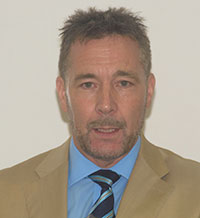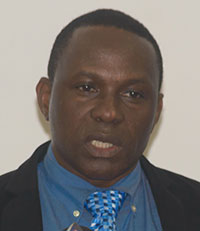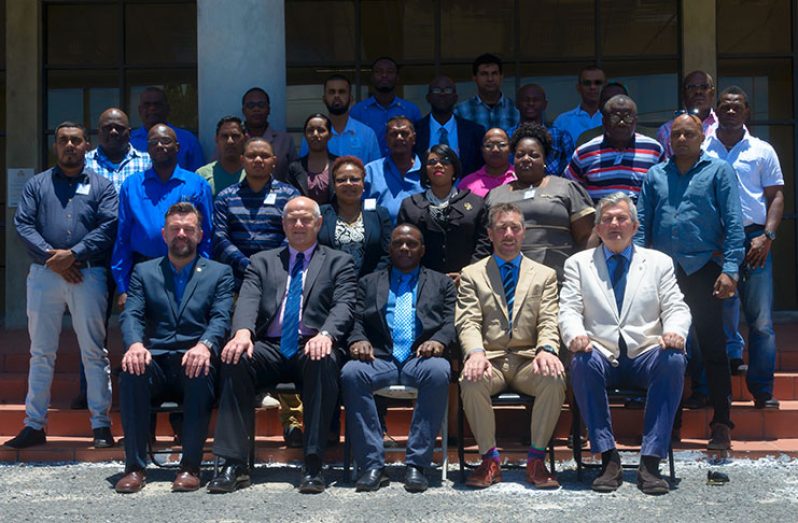— crime chief
PARTICIPANTS of a two-week anti-corruption training course facilitated by the British Government in collaboration with the Special Organised Crime Unit (SOCU) were on Friday urged not to sit idly by and allow their colleagues and seniors to stagnate progress in solving crimes of corruption.

Crime Chief Paul Williams, acknowledging that corruption has evolved rapidly over the years, noted that there is a great need for investigators and law-enforcement operators to be “contemporary”.
As such, training in anti-corruption techniques must be focused on addressing gaps and issues, while taking into consideration the culture of the jurisdiction in which the said programmes are implemented, the crime chief said.
He reminded the 30 participants from SOCU, the Customs Anti-Narcotics Agency (CANU), the State Assets Recovery Agency (SARA), the Criminal Investigations Department (CID) and the Financial Intelligence Unit (FIU), that they must maximise every opportunity presented to them in the area of bettering their anti-corruption skills.

Williams at the closing ceremony for the training programme noted that many of the participants’ superiors may not understand the “new way of doing things”, but warned the investigators against allowing their supervisors to prevent them from executing their tasks.
“… I don’t think you should sit idly by and allow those things to happen. We understand yes, you are showing respect for your superiors; you want to show that you are really and truly performing within the limitation of ethics.
“Ethics doesn’t require you to sit there idly and then don’t see things happen or move apace. Bring it to the attention of those who you think need to [know], and let us ensure that whatever is being taught is put into practice,” implored the crime chief.
Williams also called on the investigators to be proactive and expand their knowledge in their respective fields.
“With the platform you are given, you can go now and explore, read, get yourself au fait, check to see what are best practices in other places… build your own personal capacity,” he encouraged, while noting that strengthened partnerships are critical to success.
Similarly, Dr Sam Sittlington, Irish financial investigations adviser to SOCU, applauded the participants who outlined the many challenges facing them in executing their functions.
IMPRESSED
“I am so impressed about how you felt about your supervisor, colleagues and how there is a zero- tolerance attitude in your minds in dealing with these types of offences. It is a very brave decision, in an environment where you are sometimes not getting the support of your peers and to take a stand… and to say the things you have said,” Dr Sittlington stated, while noting that much more training is needed.
Corruption, the SOCU adviser said is not a new phenomenon, but has become embedded in the lives of many globally. As such, he said the course is a necessity for investigators and law-enforcement officers tasked with investigating fraud, bribery and corruption.
“Two weeks ago when this course opened, I saw investigators coming into unknown territory and during the past two weeks, I saw participants who were hungry for knowledge, who asked questions, interacted with each other and the trainers,” Dr Sittlington stated.
He disclosed that during the first week the participants were taught about fraud investigations, the body language of suspects; how to identify a believable liar or unbelievably lying as well as the fraud model; how to conduct investigations using integrity, how to gather evidence, reporting, technical support and how to deal with the seizure of computers, among other areas.
During the second week, the participants were involved in bribery investigations, case studies and risk assessments.
The programme was deemed practical and intense and necessary for the local investigators, as oftentimes they are bogged down with looking at PowerPoint presentations or other documents.
THINK CREATIVELY
The participants were called upon to think outside of the box and look at ways in which they can solve fraud, bribery and corruption cases, while ensuring that those found guilty are placed before the courts.
The two-week programme was run by British experts, Tony Crompton and Mark Dilliway, who both have over 30 years experience in serious and organised crime, as well as in fraud with the City of London Police.
Some 14 SOCU members, nine CID fraud members, two CANU, one FIU and four representatives from SARA participated in the training programme funded by the British Government; they all received certificates of completion.
Meanwhile, Presidential Adviser on the Security Sector Reform Programme, Russell Combe, told reporters at the conclusion of the two-week training programme that the said programme falls within the Security Sector Reform Programme.
“Today’s event marked the end of two weeks training in a specialist area that is important to improving the Guyana Police Force’s ability to fighting, detecting and achieving success in enforcement. It is part of what I would consider to be part of security sector reform and is one of the activities that are ongoing,” he said.
Combe in January submitted a report on the country’s security sector after spending one year here. The report is currently being considered by President David Granger. Combe will serve as the President’s adviser for another year.



.jpg)








